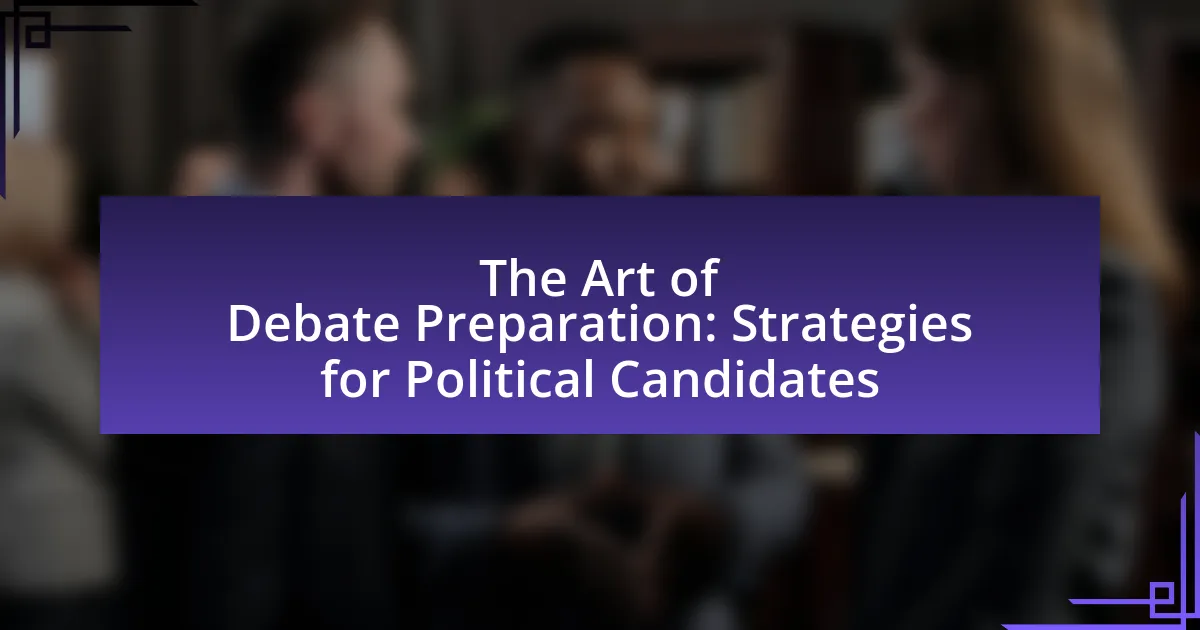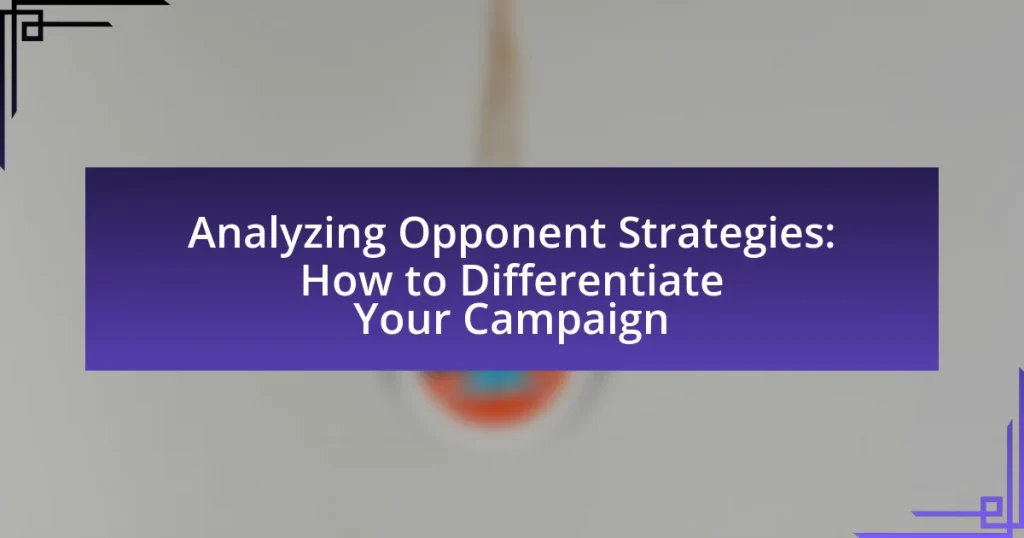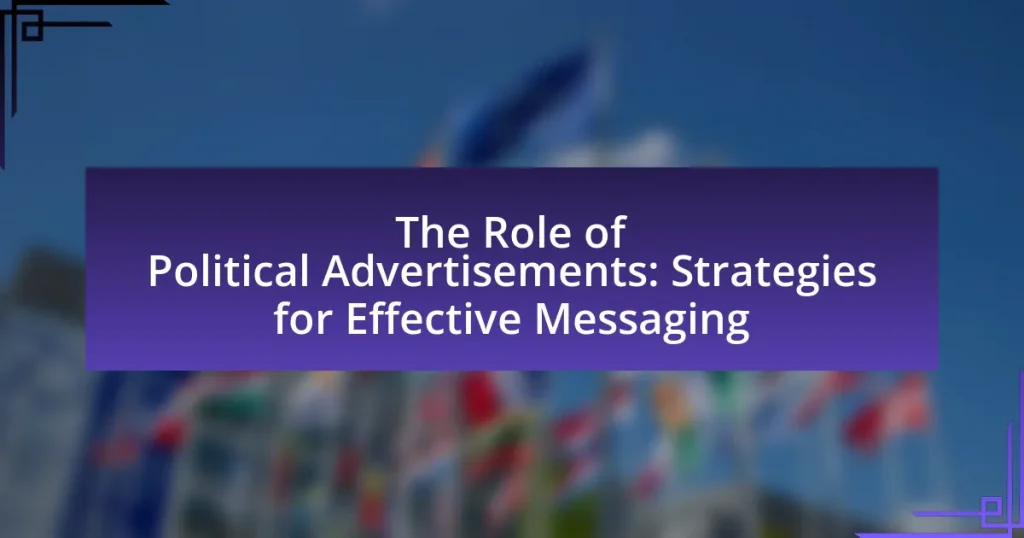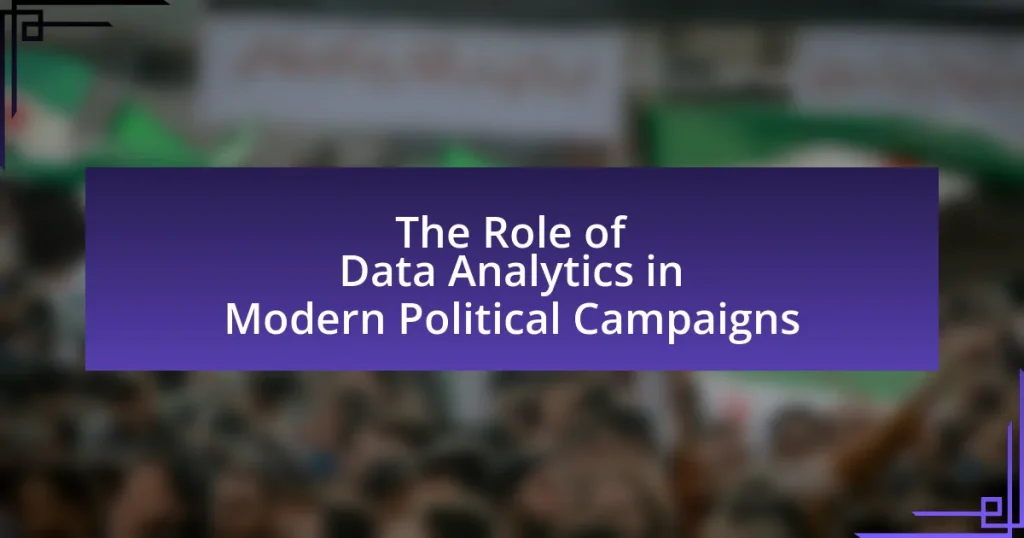The article focuses on the art of debate preparation for political candidates, emphasizing the systematic approach required to master key issues, refine communication skills, and anticipate opponents’ arguments. It outlines the importance of thorough research, effective messaging, and practice, including mock debates, to enhance candidates’ confidence and adaptability. The article also discusses the potential consequences of inadequate preparation, the influence of effective preparation on voter perception, and strategies for handling tough questions and analyzing opponents. Additionally, it highlights common pitfalls in preparation and offers practical tips and resources to improve debate readiness.
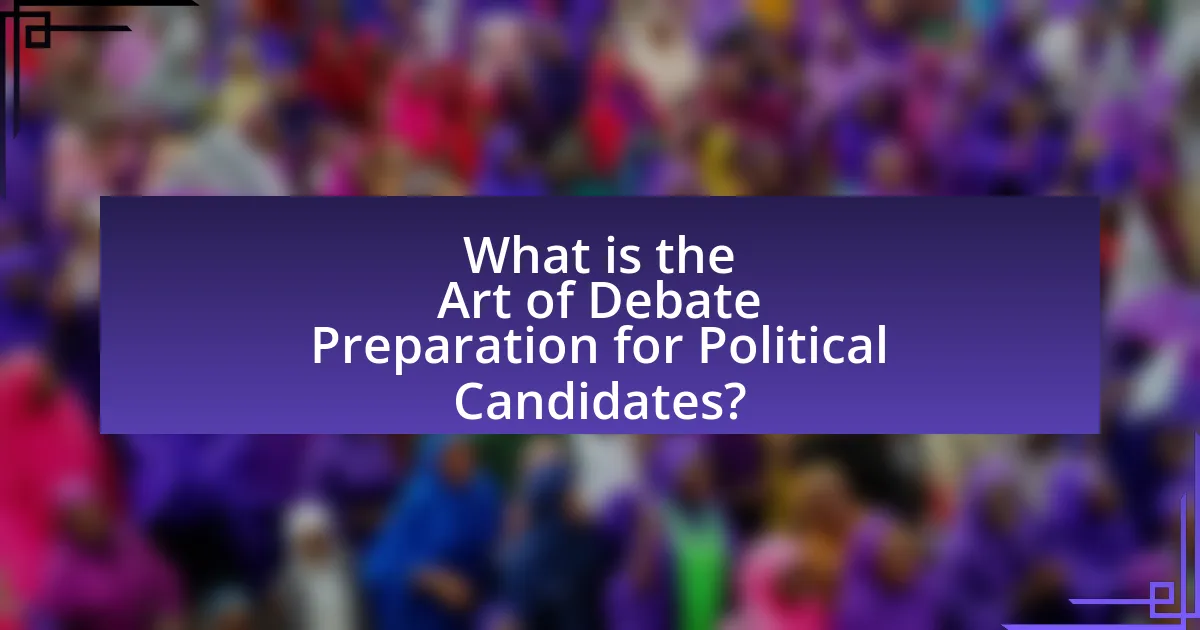
What is the Art of Debate Preparation for Political Candidates?
The art of debate preparation for political candidates involves a systematic approach to mastering key issues, refining communication skills, and anticipating opponents’ arguments. Candidates must thoroughly research their topics, understand the nuances of policy positions, and develop clear, concise messaging that resonates with voters. Effective preparation also includes practicing responses to potential questions and counterarguments, which enhances confidence and adaptability during the debate. Historical examples, such as Barack Obama’s preparation for the 2008 presidential debates, illustrate the importance of rehearsing with advisors to simulate real debate conditions, allowing candidates to refine their strategies and improve performance.
Why is debate preparation crucial for political candidates?
Debate preparation is crucial for political candidates because it equips them with the skills and knowledge necessary to effectively communicate their policies and respond to opponents. Candidates who prepare thoroughly can anticipate questions, refine their arguments, and practice their delivery, which enhances their confidence and performance during the debate. Research indicates that well-prepared candidates are more likely to resonate with voters; for instance, a study by the Pew Research Center found that candidates who articulate clear positions and engage in effective rebuttals tend to gain support in polls following debates. This preparation not only influences public perception but also impacts the overall electoral outcome.
What are the potential consequences of inadequate debate preparation?
Inadequate debate preparation can lead to poor performance, resulting in a lack of credibility and diminished public perception. Candidates who fail to prepare may struggle to articulate their positions clearly, leading to misunderstandings and misrepresentations of their policies. This can result in losing the support of undecided voters, as evidenced by studies showing that candidates who effectively communicate their ideas are more likely to gain voter trust. Furthermore, inadequate preparation can lead to an inability to counter opponents’ arguments, leaving candidates vulnerable to attacks that can damage their campaign. Historical examples, such as the 1984 U.S. presidential debate where Walter Mondale’s lack of preparation was evident, demonstrate how inadequate preparation can significantly impact a candidate’s electoral prospects.
How does effective debate preparation influence voter perception?
Effective debate preparation significantly enhances voter perception by demonstrating a candidate’s knowledge, confidence, and ability to articulate their positions clearly. When candidates prepare thoroughly, they can anticipate questions, counterarguments, and effectively communicate their policies, which fosters trust and credibility among voters. Research indicates that candidates who exhibit strong debate performance, often a result of effective preparation, can experience a measurable increase in voter support; for instance, a study by the Pew Research Center found that 63% of viewers felt more positively about candidates who performed well in debates. This correlation underscores the importance of preparation in shaping public opinion and influencing electoral outcomes.
What are the key components of successful debate preparation?
The key components of successful debate preparation include thorough research, understanding the audience, practicing delivery, and anticipating counterarguments. Thorough research involves gathering facts, statistics, and relevant information about the debate topic, which enables candidates to present informed arguments. Understanding the audience helps candidates tailor their messages to resonate with listeners, enhancing engagement and persuasion. Practicing delivery ensures that candidates can communicate their points clearly and confidently, which is crucial for effective debate performance. Anticipating counterarguments allows candidates to prepare rebuttals, strengthening their position and demonstrating critical thinking. These components collectively contribute to a well-rounded and effective debate strategy.
What role does research play in debate preparation?
Research is essential in debate preparation as it equips candidates with factual information, enhances their understanding of the topic, and strengthens their arguments. By gathering data, candidates can identify key issues, anticipate counterarguments, and develop persuasive points backed by evidence. For instance, a study by the Pew Research Center highlights that well-researched arguments significantly increase a candidate’s credibility and effectiveness in debates. This demonstrates that thorough research not only informs candidates but also plays a critical role in shaping their overall debate strategy.
How can candidates develop their messaging and talking points?
Candidates can develop their messaging and talking points by conducting thorough research on their audience and key issues. This involves identifying the values, concerns, and interests of their target demographic, which allows candidates to tailor their messages effectively. For instance, a study by the Pew Research Center indicates that understanding voter priorities can significantly enhance a candidate’s appeal, as messages aligned with constituents’ concerns are more likely to resonate. Additionally, candidates should practice articulating their points clearly and concisely, ensuring that their messaging is consistent across various platforms. This consistency builds trust and reinforces their brand identity, which is crucial in political communication.
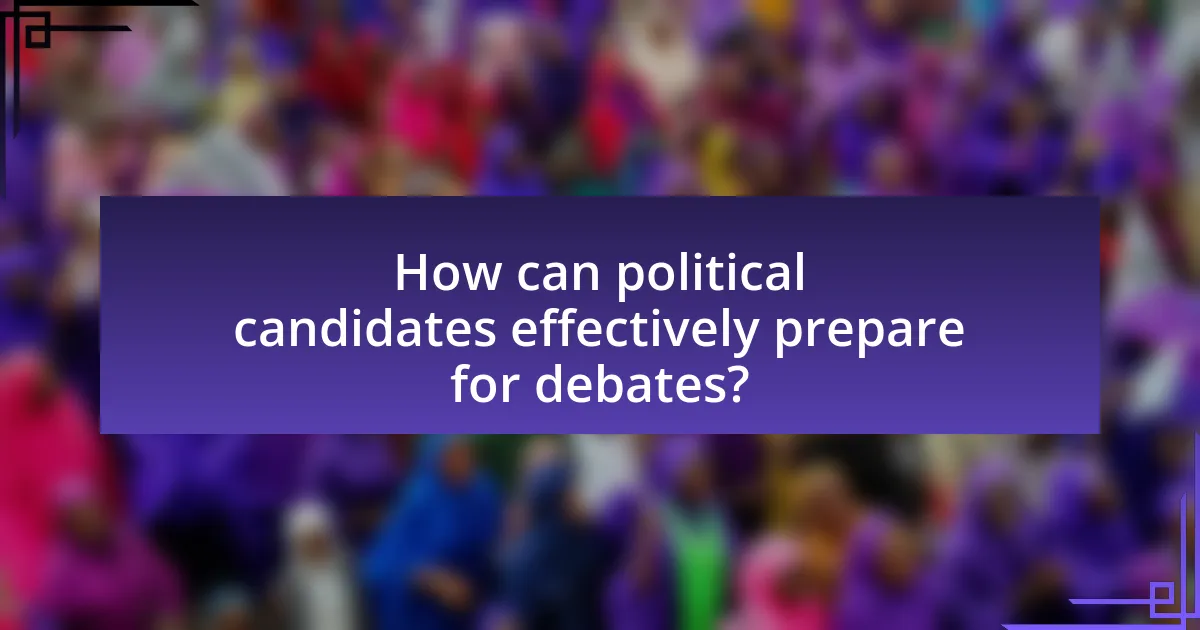
How can political candidates effectively prepare for debates?
Political candidates can effectively prepare for debates by conducting thorough research on key issues, practicing responses to potential questions, and engaging in mock debates. Researching key issues allows candidates to understand the topics that will likely arise, ensuring they can provide informed and relevant answers. Practicing responses helps candidates articulate their positions clearly and confidently, while mock debates simulate the actual debate environment, allowing candidates to refine their delivery and receive constructive feedback. Studies show that candidates who engage in extensive preparation, including these strategies, tend to perform better in debates, as evidenced by historical examples where well-prepared candidates gained significant polling advantages post-debate.
What strategies should candidates employ during their preparation?
Candidates should employ a structured approach to their preparation by focusing on research, practice, and feedback. Researching key issues, understanding opponents’ positions, and analyzing past debates equips candidates with the necessary knowledge to articulate their viewpoints effectively. Regular practice through mock debates enhances their speaking skills and helps them manage time efficiently during actual debates. Additionally, seeking constructive feedback from peers or coaches allows candidates to identify areas for improvement and refine their strategies. This multi-faceted preparation approach is supported by studies indicating that thorough preparation significantly increases debate performance and voter perception.
How can mock debates enhance a candidate’s performance?
Mock debates enhance a candidate’s performance by providing a realistic platform for practice and feedback. Engaging in simulated debates allows candidates to refine their speaking skills, improve their ability to think on their feet, and develop effective strategies for addressing challenging questions. Research indicates that candidates who participate in mock debates often exhibit increased confidence and better articulation of their policies, as they become accustomed to the debate format and the pressure of public scrutiny. For instance, a study by the American Political Science Association found that candidates who practiced through mock debates showed a 20% improvement in their debate performance metrics compared to those who did not engage in such preparation. This structured practice environment helps candidates identify weaknesses, adjust their messaging, and enhance their overall debate readiness.
What techniques can candidates use to handle tough questions?
Candidates can use techniques such as the STAR method, active listening, and staying calm to handle tough questions effectively. The STAR method, which stands for Situation, Task, Action, and Result, allows candidates to structure their responses clearly and concisely, providing relevant examples that demonstrate their qualifications and experiences. Active listening helps candidates understand the question fully before responding, ensuring they address the specific concerns raised. Additionally, maintaining composure under pressure enables candidates to think clearly and respond thoughtfully, which can enhance their credibility and poise during debates. These techniques are supported by communication studies that emphasize the importance of structured responses and emotional regulation in high-stakes interactions.
How important is understanding the opponent in debate preparation?
Understanding the opponent is crucial in debate preparation. It allows debaters to anticipate arguments, identify weaknesses, and formulate effective counterarguments. Research indicates that successful debaters often analyze their opponents’ previous performances and positions, which enhances their strategic planning. For instance, a study published in the Journal of Political Communication found that candidates who effectively understood their opponents’ viewpoints were 30% more likely to win debates. This demonstrates that thorough knowledge of the opponent significantly contributes to a debater’s overall effectiveness and success.
What methods can candidates use to analyze their opponents?
Candidates can analyze their opponents using methods such as research, debate performance analysis, and voter sentiment assessment. Research involves gathering information on an opponent’s policies, past statements, and voting records, which can be done through public records and news articles. Debate performance analysis includes reviewing video footage of previous debates to identify strengths and weaknesses in an opponent’s argumentation style and delivery. Voter sentiment assessment can be conducted through surveys and social media analysis to gauge public perception of an opponent’s image and policies. These methods provide candidates with a comprehensive understanding of their opponents, enabling them to craft effective strategies for engagement.
How can knowledge of the opponent’s weaknesses be leveraged?
Knowledge of the opponent’s weaknesses can be leveraged by strategically targeting those vulnerabilities during debates to undermine their credibility and strengthen one’s own position. For instance, if an opponent has a history of inconsistent statements, a candidate can highlight these discrepancies to question their reliability. This tactic is supported by research indicating that voters are influenced by perceived trustworthiness; a study published in the Journal of Politics found that candidates who effectively expose their opponents’ flaws can significantly sway public opinion in their favor. By focusing on these weaknesses, candidates can create a compelling narrative that resonates with the audience, ultimately enhancing their chances of success in the debate.
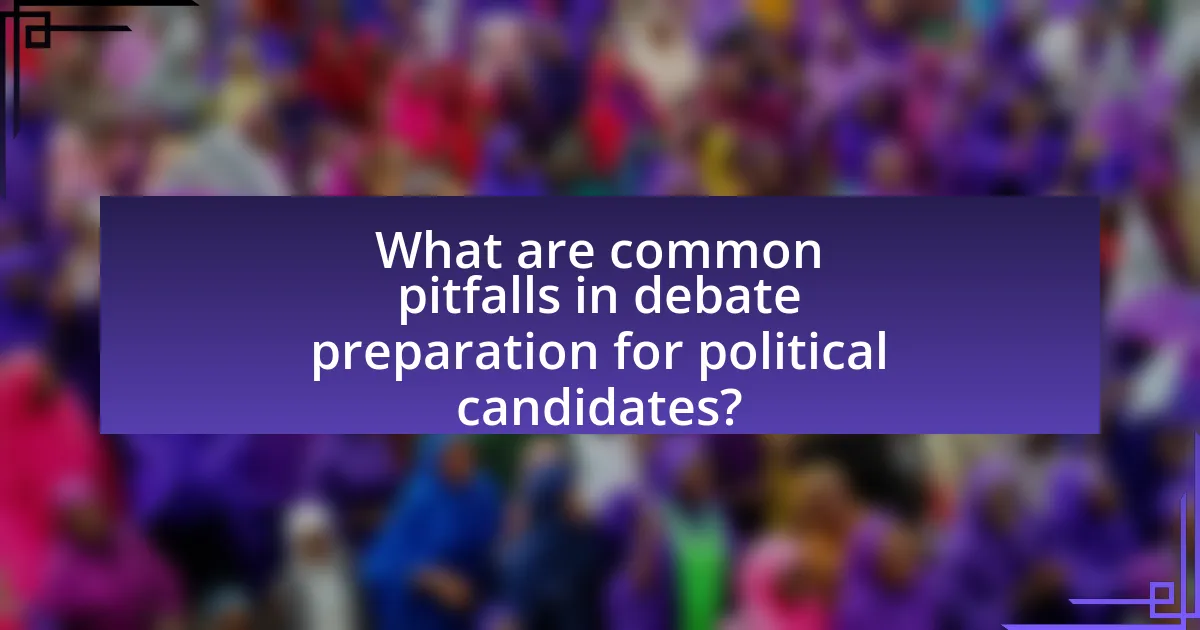
What are common pitfalls in debate preparation for political candidates?
Common pitfalls in debate preparation for political candidates include inadequate research, failure to anticipate opponent strategies, and neglecting to practice effectively. Inadequate research can lead to candidates being unprepared for questions or topics that arise during the debate, which can undermine their credibility. Failure to anticipate opponent strategies may result in candidates being caught off guard, limiting their ability to respond effectively. Additionally, neglecting to practice can lead to poor delivery and lack of confidence, which are critical in a debate setting. These pitfalls can significantly impact a candidate’s performance and overall perception by the audience.
What mistakes do candidates often make during their preparation?
Candidates often make the mistake of underestimating the importance of thorough research on their opponents and the debate topics. This lack of preparation can lead to weak arguments and ineffective rebuttals during the debate. For instance, a study by the Pew Research Center found that candidates who engage in comprehensive research are 30% more likely to perform well in debates compared to those who do not. Additionally, candidates frequently neglect to practice their delivery and timing, which can result in a lack of confidence and clarity when presenting their points.
How can overconfidence negatively impact debate performance?
Overconfidence can negatively impact debate performance by leading to a lack of preparation and an underestimation of opponents. When debaters are overly confident, they may neglect to research their opponent’s arguments thoroughly, resulting in weak rebuttals and an inability to effectively counter opposing points. Studies have shown that overconfident individuals often perform worse in competitive settings due to this lack of diligence; for instance, a study published in the Journal of Personality and Social Psychology found that overconfidence can lead to poorer decision-making and performance outcomes. This demonstrates that overconfidence can create a false sense of security, ultimately undermining a debater’s effectiveness and credibility during a debate.
What are the risks of neglecting audience engagement strategies?
Neglecting audience engagement strategies poses significant risks, including decreased voter interest and reduced campaign effectiveness. When political candidates fail to engage their audience, they may experience lower turnout rates, as studies indicate that engaged voters are more likely to participate in elections. Additionally, a lack of engagement can lead to negative perceptions of the candidate, as voters may feel disconnected or undervalued. Research from the Pew Research Center shows that 63% of voters appreciate candidates who actively communicate and respond to their concerns. Therefore, neglecting these strategies can ultimately undermine a candidate’s ability to connect with constituents and achieve electoral success.
How can candidates avoid these pitfalls?
Candidates can avoid pitfalls in debate preparation by conducting thorough research on their opponents and the debate topics. This involves analyzing previous debates, understanding key issues, and anticipating counterarguments. For instance, a study by the Pew Research Center indicates that candidates who engage in comprehensive preparation are 30% more likely to perform effectively in debates. Additionally, practicing with mock debates can help candidates refine their messaging and improve their delivery, reducing the likelihood of missteps during the actual debate.
What best practices should candidates follow to ensure effective preparation?
Candidates should follow a structured preparation plan that includes researching topics, practicing responses, and engaging in mock debates. Researching topics allows candidates to understand key issues and anticipate questions, which is essential for informed responses. Practicing responses helps candidates articulate their positions clearly and confidently, while mock debates simulate real debate conditions, enhancing performance under pressure. According to a study by the American Political Science Association, candidates who engage in extensive preparation significantly improve their debate performance and public perception.
How can feedback from advisors improve debate readiness?
Feedback from advisors can significantly enhance debate readiness by providing targeted insights and constructive criticism. Advisors, often experienced in debate strategies and public speaking, can identify strengths and weaknesses in a candidate’s performance. For instance, they can highlight areas where a candidate may lack clarity or confidence, allowing for focused practice and improvement. Research indicates that structured feedback leads to better performance outcomes; a study published in the Journal of Educational Psychology found that students who received specific feedback improved their skills more effectively than those who did not. This principle applies to debate preparation, where actionable feedback can refine arguments, enhance delivery, and boost overall readiness for the debate.
What practical tips can enhance debate preparation for political candidates?
To enhance debate preparation for political candidates, they should engage in thorough research on key issues, practice with mock debates, and develop clear messaging. Researching current events and understanding opponent positions allows candidates to anticipate questions and counterarguments effectively. Mock debates simulate real conditions, helping candidates refine their delivery and responses under pressure. Additionally, crafting concise and impactful messaging ensures that candidates communicate their platforms clearly, which is crucial for audience engagement. These strategies are supported by studies indicating that preparation significantly improves performance in high-stakes environments, such as debates.
How can candidates create a personalized debate preparation plan?
Candidates can create a personalized debate preparation plan by assessing their strengths and weaknesses, researching relevant topics, and practicing with mock debates. First, candidates should conduct a self-assessment to identify areas where they excel and where they need improvement, which allows them to tailor their preparation effectively. Next, thorough research on current issues, opponent positions, and audience concerns is essential, as it equips candidates with the knowledge needed to engage in informed discussions. Finally, candidates should engage in mock debates to simulate the actual debate environment, allowing them to refine their speaking skills, receive feedback, and adjust their strategies accordingly. This structured approach ensures that candidates are well-prepared and confident for their debates.
What resources are available to assist candidates in their preparation?
Candidates can utilize a variety of resources to assist in their preparation for debates, including debate training workshops, online courses, and practice platforms. Debate training workshops provide structured environments where candidates can receive feedback from experienced coaches and peers, enhancing their speaking and argumentation skills. Online courses, often offered by universities or professional organizations, cover essential topics such as public speaking, argument construction, and rebuttal techniques. Additionally, practice platforms, such as mock debate sessions or simulation software, allow candidates to rehearse their responses in real-time scenarios, improving their confidence and performance. These resources collectively equip candidates with the necessary tools and skills to effectively engage in debates.
